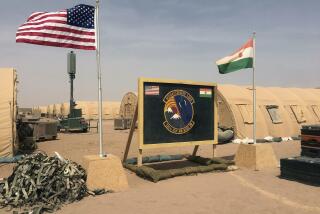U.S. Team Will Visit Liberia for Assessment
- Share via
DAYTON, Ohio — President Bush on Friday took another step toward deploying troops to Liberia, ordering a military assessment team to West Africa even though he has yet to make a final decision on whether U.S. forces will take part in an expected U.N. peacekeeping force.
White House officials were encouraged by reports from Monrovia, the Liberian capital, that President Charles Taylor had agreed to step down, but they were waiting for more details.
“If the reports are accurate, this is an encouraging sign,” White House Press Secretary Ari Fleischer said en route with Bush to Independence Day celebrations here.
“The president urges Mr. Taylor to back up his encouraging words with deeds so that the stability of the region can be achieved, so that peace can become effective and so that the lives of the Liberian people in the region can be improved.”
The assessment team’s departure is part of preparations for any deployment, Fleischer said. “This is part of planning so that ... all options are on the table if -- and I still emphasize ‘if’ -- the president decides to send troops,” he said.
Fleischer declined to provide details about the team other than to say its members would meet with officials from the Economic Community of West African States, the group of nations that is expected to provide the bulk of the stabilization force.
A team of 10 to 15 people will be sent first to the U.S. Embassy in Monrovia, a Pentagon official said Friday, speaking on condition of anonymity. The official declined to say when the team would arrive but said it would travel to the embassy “in order to make an on-the-ground-assessment of the situation.”
Tentative plans under discussion would have the United States provide 500 to 2,000 troops, who would lead the multinational effort and provide communications and logistics.
Fleischer would not say when the president might make a decision on deployment. The White House is eager to resolve the issue before Bush leaves Monday for a five-day tour of sub-Saharan Africa meant to showcase its initiatives on AIDS and economic development for the continent.
Bush’s national security team debated the issue through much of last week, with the Pentagon reportedly reluctant to commit troops and the State Department in favor of sending them. Bush’s top national security advisors discussed Liberia at their usual morning meeting Friday and were expected to do so again today.
Fleischer said Friday that “there is no artificial deadline” for making a decision. He also declined to say whether the United States would insist that Taylor be prosecuted for war crimes; Taylor has demanded immunity from prosecution as a condition of his resignation.
“First things first,” Fleischer said. “He needs to leave the country.”
Bush was in Dayton to attend Fourth of July ceremonies and mark the 100th anniversary of the Wright brothers’ achievement of human flight. The president did not mention Liberia in his speech, but said that “we still pledge our lives and honor to freedom’s defense. And we will always believe that freedom is the hope and the future of every land.”
In Monrovia, Taylor told a gathering of religious leaders that he would step down, but he said he would relinquish power only after international peacekeepers arrived.
“It makes a lot of sense for peacekeepers to arrive in this city before I transit,” Associated Press quoted Taylor as telling the clerics.
“I welcome and will embrace the presence of American troops in Liberia. I think it will be essential for stability,” he said. “I don’t understand why the United States government would insist that I be absent before its soldiers arrive.”
With its forces spread thin across the globe, the Pentagon has pushed for any deployment to Liberia to be limited in duration and scope. The West African nation has been racked by civil war for more than a decade, and rebel forces have overrun parts of the capital.
Liberia was founded by freed American slaves in the 1800s, and its capital is named for President James Monroe. The nation was also a Cold War ally of the United States.
Taylor is a former warlord who was elected president in 1997. Rebels have been fighting to unseat him since 1999. The fighting has displaced thousands of Liberians.
In a statement issued in Geneva on Friday, the World Health Organization warned that tens of thousands of Liberians faced a health crisis unless international donors helped.
“Although fighting in the Liberian capital has currently subsided, tens of thousands of men, women and children displaced by the recent fighting are still living in desperate conditions in rudimentary shelters with minimum access to health care,” Gro Harlem Brundtland, director-general of the United Nations agency, said in the statement.
“Failure to address this situation is compounding Liberia’s humanitarian crisis and putting the lives of many thousands of people at risk.... The international community must offer urgent assistance.”
Liberians need clothing, chlorine to treat water and vital drugs. They also face food shortages, the WHO said.
U.N. Secretary-General Kofi Annan on June 28 called for the Security Council to deploy an international force to the country.
He warned that a “humanitarian tragedy” loomed without international intervention to enforce a cease-fire, and he urged that a force be sent “to stabilize the situation.” A June 17 cease-fire accord called for an international peacekeeping force, but the accord collapsed when Taylor rescinded an earlier agreement to leave and rebels attacked the capital.
More to Read
Sign up for Essential California
The most important California stories and recommendations in your inbox every morning.
You may occasionally receive promotional content from the Los Angeles Times.









